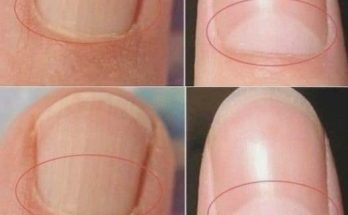If you plan on spicing things up in the bedroom, then take care with how you tread as one wrong slip could send you to the emergency room.
To be honest, the ER doctors have likely seen many weird things come through their doors, so it’s nothing new for them – except for a WWI bomb lodged in someone’s rectum.
That’s not something you’d see everyday.
However, sex toys in places they shouldn’t be are a dime a dozen, according to a 2023 study, as they make up 95 per cent of emergency trips.
So if you don’t want to end up in that percentage, an expert has advised what to look out for to make sure that doesn’t happen.
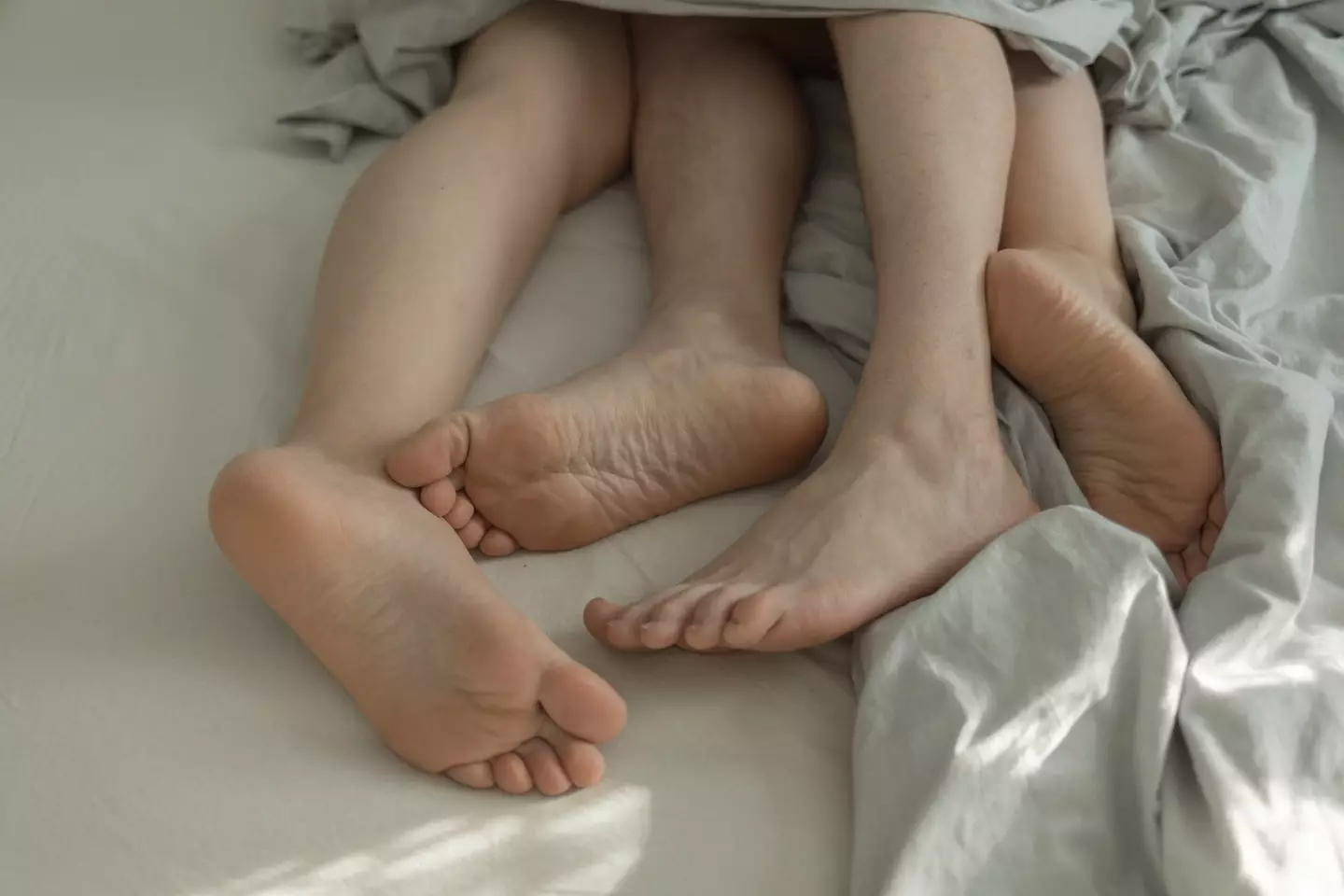

A trip to the ER really kills the mood (Getty Stock Photo)
Kate Shelor, who is an intimacy coach and hypnotherapist, revealed that buying cheap toys can factor into it, which can be pretty unhygienic if you don’t look after them properly.
“Silicone, glass, and stainless steel toys can last for years with proper cleaning, but jelly, TPE (thermoplastic elastomers), or cheaper materials break down faster and can trap bacteria,” she told the Daily Mail.
“So if it gets sticky, discolored, or smells weird even after washing, it’s time to say goodbye.”
She added: “You may find super cheap toys at certain international online retailers but be aware that the materials may not truly be body safe. And of course, don’t just stick random objects in your body — if it’s not designed for internal use, it does not belong inside you.”
Shelor went on to explain how using non-anal toys for anal pleasure may lead to a trip to the emergency room.
“The most common one I hear is people using non-anal toys for anal play,” she added. “It’s vital that you use toys specifically made for anal play. They will have a flanged base and be built for easy removal.
“When you use a toy not meant for anal it can easily get stuck up inside your body, often requiring an emergency room visit! Nobody wants that.”
Alicia Davis knowns all about things going wrong with sex toys following a first date that didn’t exactly go to plan.


According to the expert, some materials aren’t ‘body safe’ (Getty Stock Photo)
Davis’ first date with a guy was going extremely well, and the mood was right for them to take things to the bedroom.
But as she explained in a viral TikTok video, Davis found herself needing medical attention after suffering an ‘unfortunate sex mishap’.
Davis revealed that she had been using an anal plug, but what happened next was certainly unfortunate.
Speaking to News.com.au, the 32-year-old said: “All of a sudden it felt like it had fallen out of me.”
After searching the sheets and turning the bedroom upside down, Davis had no idea where the NSFW toy had gone.
“So we stopped, and I put my hand down there to discover that it was gone,” she added. “We started pulling the doona and the pillows off the bed, looking underneath the bed for it… but it was no where to be found.”
The sex toy hadn’t ‘disappeared’; it was instead lodged inside her, so a trip to the emergency room was certainly required.
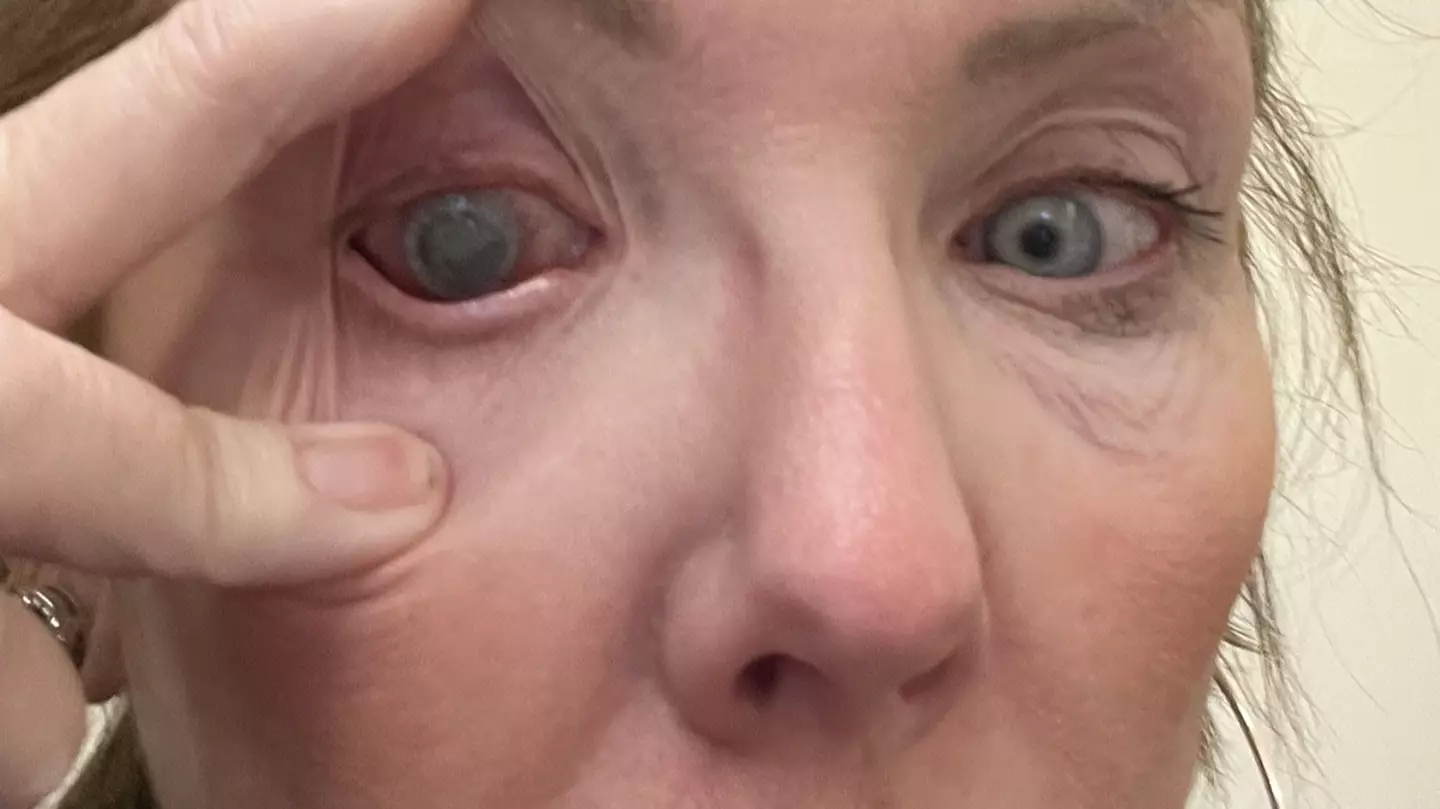

A woman made an easy mistake with her contact lenses and is losing her eyesight as a result.
Millions of people across the globe are contact lens-wearers, and there’s a good chance at once they’ve done what Maureen Cronin did, that ended up with her being diagnosed with a rare infection.
Tragedy struck for Maureen in August last year as she was hospitalized at Stony Brook University Hospital in New York, US.
The 53-year-old ended up needing a cornea transplant in September 2024, but her eye rejected the transplant.


New Yorker Maureen Cronin has worn contact lenses for almost 20 years (Kennedy News and Media)
Maureen claims the steroid drops prescribed to help the pain have caused her to develop glaucoma. As a result, she’s now almost completely blind in her right eye and is waiting to undergo another cornea transplant to hopefully restore some of her sight.
As to what caused the infection, it all comes down to Maureen wearing her lenses in a swimming pool.


The 53-year-old has almost lost all of her vision in her right eye (Kennedy News and Media)
Maureen began offering swimming lessons to young children in their private backyard pools in June last year, but after teaching seven children while wearing her contact lenses in the water, she claims that her right eye started to irritate her.
Maureen, who has worn contact lenses for almost 20 years, said it felt like she had a grain of sand stuck in her eye and when the pain became ‘excruciating’ she visited an eye doctor who prescribed her eye drops.
The eye drops didn’t help, however, and eventually she was diagnosed with acanthamoeba keratitis (AK). According to Cleveland Clinic, AK is ‘a rare parasitic eye infection from a certain type of amoeba’.
It goes on: “It affects the cornea, the clear, dome-shaped front covering of your eye. When not treated, it can damage your eyes and cause loss of sight.”
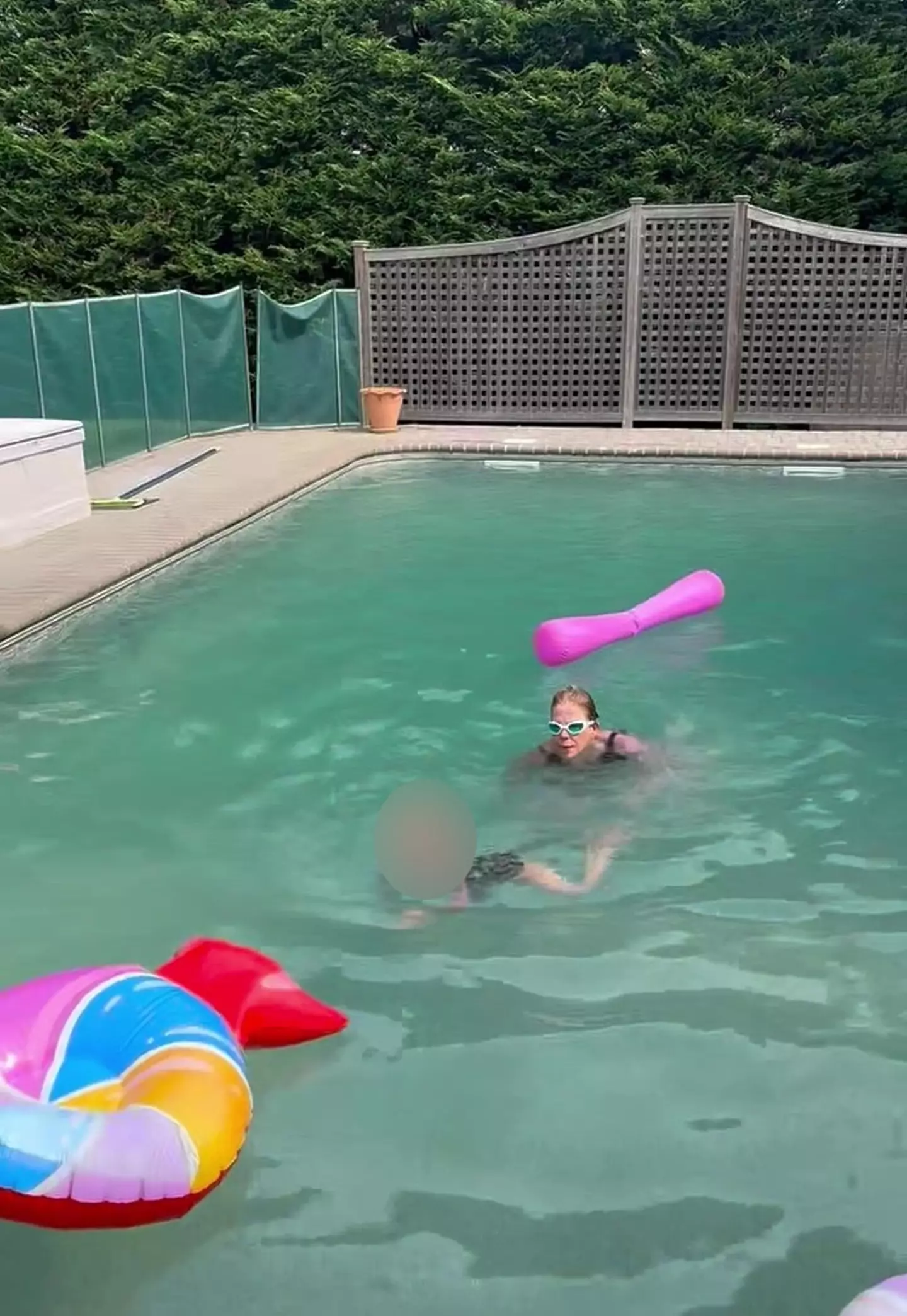

She began teaching kids how to swim last year (Kennedy News and Media)
Maureen has now been raising awareness about her AK diagnosis in a bid to warn others about wearing contact lenses around water to stop this from happening to them.
“I am hopeful but fearful at the same time [about the next cornea transplant]. I’m afraid it won’t take. It feels like it’s never ending and I’m nervous,” she said.
“AK is not well known and it is often misdiagnosed. I would say anyone who wears contact lenses shouldn’t wear them near any body of water.”
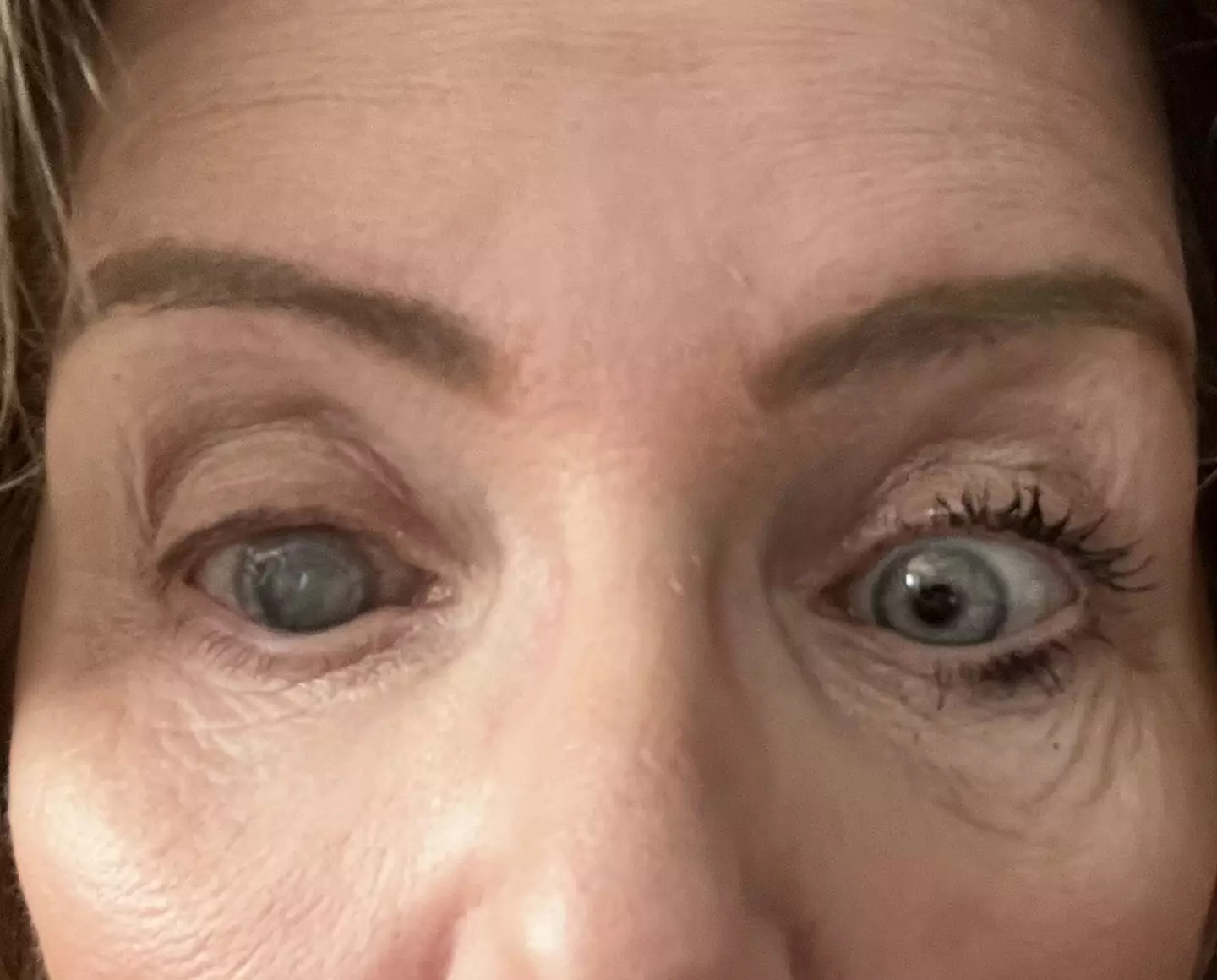

Maureen’s eye ended up clouding over (Kennedy News and Media)
Maureen admitted: “I now have a fear of being near any kind of water. I shower with my goggles on.
“My eye is cloudy because of the cataract and the pupil is large. It’s off putting because the pupil is so big and it looks cloudy.”
She went on: “If you treat it early, you can kill the parasite and you don’t have to go through the hospital and surgery process.
“I was not aware at all, I was never told by my optician to never wear them in water.”
A surgeon has explained the big mistake people make after using the toilet which could result in some painful health issues.
Going for a number two and then using toilet paper just goes hand in hand, doesn’t it? But are we doing more harm than good with this form of wiping?
Well, according to leading proctologist Dr Evan Goldstein that’s exactly what we’re doing, and he’s advised against ‘traditional wiping’.
On top of that, Dr Goldstein has even greater concerns for those who use wet wipes to ensure their backside is clean.


Toilet paper is a staple of any bathroom (Getty Stock Image)
The expert provided his thoughts on HuffPost’s Am I Doing It Wrong? podcast, where he shared a warning to those who wipe a certain way.
Dr Goldstein explained how skin around the anus is particularly sensitive and that using toilet paper can be a recipe for disaster.
I mean, many of you will be thinking you’ve used toilet paper all this time and been fine, but the doctor has said wiping in such a way can lead to to irritation, tears and even long-term damage in the most extreme cases.
And the introduction of wet wipes to the bathroom means Dr Goldstein is seeing such symptoms more commonly.
He said: “They are so terrible – not only for the environment, but for your hole. There’s so many companies out there throwing wipes and I think they should all be banned. I see 90 people a week, and I would say one-third of all the people coming through are coming in from wet wipe-induced issues.”


Apparently, it’s a big mistake many are making (Getty Stock Image)
The doctor added: “Think about it – we have good bacteria, we have bad bacteria, but they are in homeostasis. They are in equilibrium. Wet wipes f*** that in a really bad way.
“I see ridiculous dermatitis and bacterial infection [in patients]. Now that they’ve messed up that microbiome, it’s causing so many problems.”
Some of the worst symptoms that can come from this include fissures and even fungi growth.
Instead, Dr Goldstein advised using a bidet or hopping in the shower for a quick clean but warned to make sure the area is fully dry afterwards.
If you have no other choice but to use toilet paper, the surgeon suggested carefully blotting rather than wiping.
Another important step to remember when wiping is that you don’t do it more than three times.
In a TikTok video, pelvic floor physiotherapist George, explained: “When you are wiping more than two or three times, that is called faecal smearing.
“So it is essentially when too much faeces matter stays at the entrance of the anus even after you have finished your poo.”
The more you know, eh?
A psychologist has revealed some ‘autistic stims’ which are ‘quite common’ to keep an eye out for if you suspect may have the neurodevelopmental disorder.
It’s 2024, and people are a lot more aware and open when it comes to mental health then in previous years, but it can still be hard to know whether or not you may be experiencing certain conditions or not.
A psychologist has subsequently taken to TikTok to share certain ‘stims’ people with autism may exhibit more so than others.
Stimming
Psychologist Dr Kim Sage took to her TikTok to share some ‘autistic stims’ which are ‘quite common’.
Stims refers to stimming which, as per Healthline, ‘refers to the natural behavior of self-stimulation’.
It’s website continues: “It may include nail biting, drumming your fingers on a surface, or full body movements like rocking or swaying.”
Healthline notes ‘everybody stims in some way’, however, some people’s stimming is more noticeable than others.
And while stimming is not always related to autism, in some people with autism, it can become ‘out of control and cause problems,’ and so it is subsequently ‘part of the diagnostic criteria for autism’.
But what are some common stims?


A psychologist has opened up about ‘quite common’ ‘stims’ in people with autism (TikTok/ @drkimsage)
Stimming sometimes common in those with autism
In her video shared earlier this year, Dr Sage reveals ‘hair twirling’ or ‘playing with hair’ can be a stim exhibited by those with autism – although she notes, ‘most everyone stims and doing these does not make you autistic’.
Others include playing with jewelry, twirling or rubbing a blanket, playing with or clicking pen caps, biting your nails or picking at the skin at the sides, making sounds with your mouth or tapping your nails together.
More widely, ‘repeating dances, songs, lyrics, trending sounds/ videos,’ can also be a stim associated with autism too.
Healthline is quick to note stimming ‘isn’t necessarily a bad thing that needs to be stifled’ and is just something to keep an eye on.
But when should you address it and go to a healthcare professional?
When stimming should be professionally addressed
Healthline says it’s good to address stimming if it ‘interferes with quality of life’ or becomes ‘disruptive to others’.
It explains: “Almost everyone engages in some form of self-stimulating behavior. You might bite your nails or twirl your hair around your fingers when you’re bored, nervous, or need to relieve tension. Stimming can become such a habit that you’re not even aware you’re doing it. For most people, it’s a harmless behavior. You recognize when and where it’s inappropriate.
“For example, if you’ve been drumming your fingers on your desk for 20 minutes, you take social cues that you’re irritating others and choose to stop.”
In people with autism, stimming ‘might be more obvious’ in how it presents itself, whether this is ‘full-body rocking back and forth, twirling or flapping the hands’, however, it’s important to note there is a spectrum and one person’s symptoms will differ from others.
Although, Healthline notes stimming ‘can go on for long periods’ in people with more pronounced autism and ‘often, the individual has less social awareness that the behavior might be disruptive to others’.
Even in those with autism, it’s not ‘always cause for concern,’ but if it ‘interferes with learning, results in social exclusion, or is destructive,’ it’s definitely something to seek professional advice and support for.
If you or someone you know is struggling or in crisis, help is available through Mental Health America. Call or text 988 to reach a 24-hour crisis center or you can webchat at 988lifeline.org. You can also reach the Crisis Text Line by texting MHA to 741741.
Bryan Johnson has alleged that a daily habit that most Americans do could be affecting their IQ.
Johnson is a 47-year-old biohacker and venture capitalist who spends an eye-watering $2,000,000 annually on reversing the aging process.
From getting a ‘total plasma exchange’ to having his joints injected with hundreds of stem cells – there’s very little that Johnson won’t do in a bid to make himself younger.
In fact, last year he insisted that because he’s managed to successfully slow down the aging process, he can celebrate his birthday once every 19 months instead of 12.
Johnson has looked into almost everything when it comes to things that positively and negatively benefit the body, and he’s now claimed that a daily habit of most Americans’ could be allegedly lowering their IQ.
The habit is question is drinking water; something we should be drinking around 2.7 liters or 3.7 liters a day (depending on your gender), says Mayo Clinic.
In a lot of water supplies globally, it’s likely you’ll find fluoride in it – which may be there naturally or added through fluoridation schemes.
In America, water has had fluoride in it for decades, but Robert F Kennedy Junior, the newly-elected Secretary of Health and Human Services who often goes by RFK, wants to remove it.
As to what it is, fluoride is a mineral that occurs naturally in water, soil and air.


Robert F Kennedy Junior is now the US Secretary of Health and Human Services (Andrew Harnik/Getty Images)
It’s been demonstrated to prevent dental cavities, explains Reuters, has been added to American water since the 1900s. The Michigan city of Grand Rapids being the first place to add fluoride to its water supply in 1945, and now, around 63 percent of Americans have fluoride in their community water systems, the CDC said in 2022.
But some studies have suggested that higher amounts of fluoride in water may lower a person’s IQ, which Johnson has also alleged.
Speaking to Mail Online, the biohacker shared: “My team and I have been looking at RFK’s proposals and we’ve been checking them against the scientific literature, and fluoride was one that actually stood up to the evidence.
“It seems to be an evidence-based decision to remove fluoride. It’s a good decision to remove it from the water supply.”
While the likes of Johnson and RFK have their questions about fluoride-infused water in the US, it’s been suggested elsewhere that the doses of fluoride used in most water supplies doesn’t pose much risk.


There’s been raised concerns about fluoride-infused water and neurocognitive development (Getty Stock)
In a episode of Johns Hopkins University’s podcast Public Health On Call, Charlotte Lewis, MD, a paediatrician at Seattle Children’s hospital and a professor at University of Washington Medicine, said of the idea of scrapping fluoride from water: “Trying to connect fluoride in the water to health risks has been going on for decades. Those potential connections, for example, hip fractures or bone cancer, have all been disproven through robust research.”
Lewis continued: “The more recent concerns that have arisen, are about the impact on neurocognitive development based on fetal and early childhood exposure to fluoride.
“We don’t know what the exact dose is that would cause those problems. We know that in environments, such as India, China, and Iran, where there’s very high concentrations of fluoride naturally present in the soil, that there can be an increased risk of a neurocognitive effect of very high exposure [to] fluoride—but the quality of the studies is poor.
“Based on that, concerns then spread to lower levels of fluoride exposure, including what we use for community water fluoridation.”









